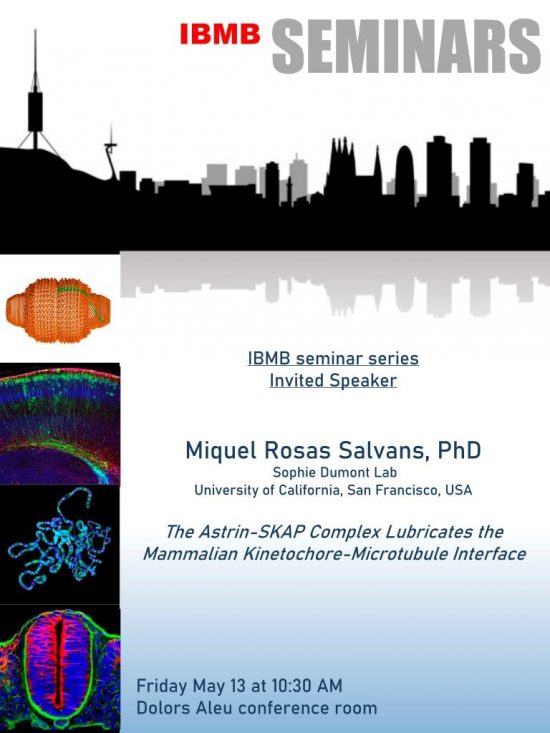Date: Friday, April 12th | Felix Serratosa room | 12|04|2024 Time: 10:00 AM Speaker: Valerio Di Domenico Guerin…
IBMB Seminar, Friday, May 13th. 10:30 | MIQUEL ROSAS SALVANS, PHD
Date / Time: Friday, May 13th, 10:30 AM | Dolors Aleu conference room | 13|05|2022
Speaker: Miquel Rosas Salvans, PhD. Sophie Dumont Lab, University of California, San Francisco, USA
Title: “The Astrin-SKAP Complex Lubricates the Mammalian Kinetochore-Microtubule Interface”
Dolors Aleu conference room. Please, members of IBMB, check your mailbox.
Abstract: Each time a cell divides, it must equally distribute its genetic material to its daughter cells. The kinetochore is the large protein complex that links chromosomes to dynamic spindle microtubules to move and segregate them. While we know nearly all mammalian kinetochore proteins, how these give rise to dynamic yet strong microtubule attachments remains poorly understood. In this talk, I will focus on the Astrin-SKAP complex, which localizes to bioriented kinetochores and is essential to chromosome segregation, but whose mechanical role is unclear. Using live imaging, we find that SKAP depletion dampens metaphase kinetochore movements, reduces sister kinetochore coordination and increases the tension between sisters. Using laser ablation to isolate kinetochores bound to polymerizing vs depolymerizing microtubules, we show that without SKAP kinetochores move slower on both polymerizing and depolymerizing microtubules, and that more force is needed to rescue microtubules to polymerize. Thus, in contrast to previously described kinetochore proteins that increase the grip on microtubules under force, Astrin-SKAP reduces grip, lowering friction. Together, our findings suggest a model where the Astrin-SKAP complex effectively “lubricates” correct, bioriented attachments to help preserve them and ensure a smooth chromosome movement and faithful segregation.
Bio: I studied biology as a bachelor’s student and cell biology as a master’s student at the Autonomous University of Barcelona (UAB). I then obtained my PhD in cell biology at the Center for Genomic Regulation (CRG) in Barcelona, working with Isabelle Vernos. During this time, I used mass spectrometry, cell and molecular biology to describe the dynamic changes of the proteome that drive microtubule self-organization at M-phase. This gave us a detailed picture of how local variations in individual protein levels can drive global changes in the structure of the microtubule network (Mol Cell Proteomics, 2018). I focused on events triggered by the Ran-GTP gradient generated around chromosomes, ultimately defining the role of DnaJB6 as a dynein regulator in spindle assembly and spindle poles focusing (J Cell Sci, 2019). During this time, I became interested in the physics behind the biology I was studying, and this motivated my next step. In 2019, I started as a postdoctoral fellow with Sophie Dumont at the University of California, San Francisco, aiming to gain training in physical thinking and approaches in cells. I am asking how the mammalian kinetochore-microtubule interface can be at once so robust and strong yet dynamic – two properties essential for accurate chromosome segregation. While most kinetochore proteins we know increase grip at the kinetochore-microtubule attachment interface, I recently uncovered that the Astrin-SKAP complex reduces friction at this interface, effectively acting as a lubricant (Current Biology, in press; available in Biorxiv). I propose a model where the Astrin-SKAP complex effectively “lubricates” correct, bioriented attachments to help preserve them and ensuring faithful chromosome segregation. When I’m out of the lab, I love spending time in nature, especially climbing and hiking, and now also surfing as a new “Californian”.


